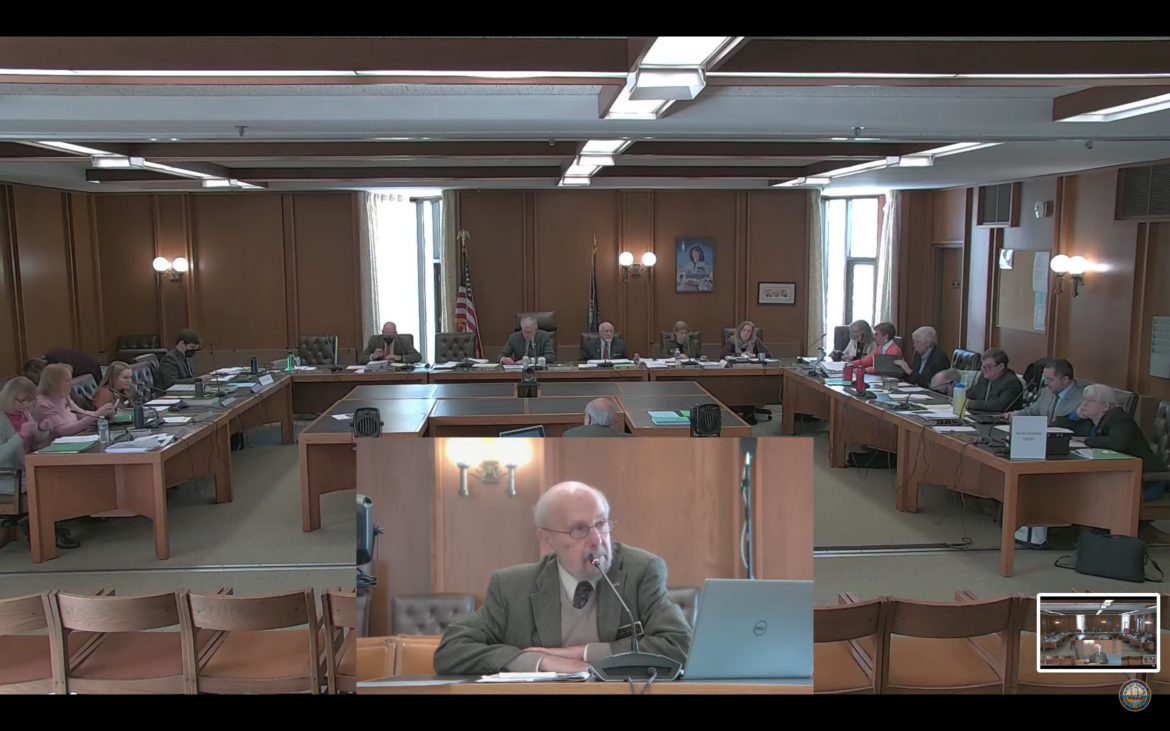By GARRY RAYNO, InDepthNH.org
CONCORD — State representatives seeking to change the state constitution to remove the Blaine amendment argued it is a relic from a bigoted past Friday at a public hearing.
The House Education Committee listened to only state representatives testifying in favor of changing the constitution to remove the amendment, with no members of the public or anyone opposed at the hearing.
Much of the discussion by the representatives concerned religious bigotry of the times against Catholics as being the impetus of the Blaine amendment that many states added to their constitution in the late 1800s.
The amendment prohibits the spending of state tax dollars on religious schools and is named after the Maine Senator who advocated for it after it failed to pass the US Senate by one vote.
The bill’s prime sponsor, Rep. Glenn Cordelli, R-Tuftonboro, listed US Supreme Court decisions in recent years allowing state money to be spent on such things as playground equipment for religious schools or for tax credits as scholarships to religious schools or in districts where there is no available public school such as a high school.
“New Hampshire needs now to repeal this unconstitutional amendment,” Cordelli said. “Blaine of Maine is dead and the New Hampshire Blaine amendment deserves the same fate.
There is no excuse not to repeal this anti-religion amendment.”
Several committee members asked Cordelli if the amendment stays in the constitution, would it open the state to lawsuits to prevent the state from using tax dollars to pay for religious schools.
Cordelli said it would leave the state open to lawsuit, but it would not be wise given the US Supreme Court decisions.
Rep. Bob Lynn, R-Windham, a former state Supreme Court Chief Justice, also supported the proposed change in the constitution.
He said the Blaine amendment is no longer effective given the US Supreme Court decisions and could not be enforced because it is blatantly unconstitutional.
“The sensible thing to do is to remove it from the constitution,” Lynn said.
But Rep. Mel Myler, D-Hopkinton, asked if the US Supreme Court rulings on the issue were not very narrow, about playground equipment, tax credits which some contend is not tax dollars, and a rural community that has to tuition students to out-of-districts schools because they have none of their own.
Myler said the state’s original constitution has a provision that no tax money go for religious purposes.
Lynn said that is right, but he is not sure about religious schools, but more broadly about religion.
Bill co-sponsor, Rep. Katy Peternal, R-Wolfeboro, said if it weren’t a constitutional amendment, she would call it a housekeeping measure.
“This is a simple request to right a wrong,” she said, “when the amendment was added out of bigotry against Catholics.”
She discussed the relationship of public and parochial schools over the state’s history and noted when the school population exploded in the 1950s, the state could not educate all the children without the religious schools.
Rep. David Luneau, D-Hopkinton, asked Peternal what repealing the amendment would do to prevent what is happening today.
“You want to repeal this to do what,” he asked.
“Nothing,” she said, noting that is why she called it a housekeeping measure.
“It does not belong in the constitution,” she said. “It is a bigoted statement.”
Currently state grants awarded through the Education Freedom Account program are used to pay tuition to religious schools as well as private schools and homeschools where parents may use religious curriculum.
The state tax credit scholarship program also pays for religious school tuition.
The committee will decide its recommendation on the proposed amendment at a later date.
The electronic sign-in system indicates 154 people oppose the bill, while 10 support it including the Roman Catholic Diocese of Manchester.
In order to be placed on the 2024 general election ballot, CACR 7 will need a three-fifth majority vote by the House and by the Senate.
If it is approved, it will need a two-thirds vote to change the constitution.
Garry Rayno may be reached at garry.rayno@yahoo.com.





